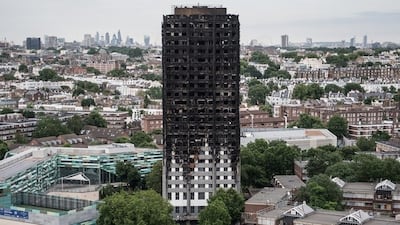I drove past the burnt-out corpse of the London tower block that suffered the catastrophic fire earlier this month. The building's 24 storeys were charred black, like a hellish ghoul looking over the whole of West London. Nearly 100 people have been reported dead, but the toll is likely to be much higher as the building was home to more than 500 people.
As a catalogue of human failings emerges – from selecting cheaper inflammable cladding, saving costs by not installing sprinklers and cuts to local fire services – it appears that this horrendous disaster was entirely avoidable.
The residents had repeatedly raised concerns about fire safety, and been ignored. In fact, the Grenfell Action Group had darkly predicted that only a catastrophic fire would make the authorities listen to their warnings. The building is located in the richest area of the whole of Britain, and very possibly one of the most expensive of the whole world. It is also home to some of the poorest and most diverse ethnicities, like the residents of Grenfell.
So the obvious question is, why weren’t their voices listened to? The answer is equally obvious – to those of us whose voices are routinely ignored, talked over and diminished. If a person wields status and privilege, then their words are interpreted within that framework as important, meaningful and to be acted upon. For a person without status - their poverty, class, ethnicity, language, networks and possibly even faith -- means their voices are muted rather than amplified, their importance diminished.
This problem of reducing the value of some voices recurs again and again across societies.
I recognise this from my own experiences as a small, Asian, visibly Muslim woman. In countless meetings, making contributions, I can see that a point I made was completely unremarked on until a white man – often older - made the same point.
Women's voices are routinely ignored. Think about how in cases of domestic violence male perpetrators of horrific abuse are believed to be truly repentant simply by saying sorry. But when their female partners state they are in fear for their lives, their concerns are diminished and they are told to stay and be patient. The men’s empty words mean more than the black bruises and broken bones of the women.
Class has a huge role, excusing failings or elevating empty opinions, whereas those of poorer, less privileged classes have their voices mercilessly maligned. Again, just think of the UK’s most famous bumbler, Boris Johnson, a man whose errors are placed on a pedestal and excused with its own term, just "being Boris". No poor person, woman or minority, would be excused in this way.
The class issue excuses even the unpalatable, giving hatred a veneer of respectability. Anti-Muslim protesters like leading hate figure Tommy Robinson are considered working class thugs, but put the same words into posher language and it becomes a legitimate opinion. Tommy Robinson gets blamed for his followers’ carnage, but poshly spoken commentators like Katie Hopkins claim that those who commit hate acts are nothing to do with them. Yet over the weekend in the UK a Muslim man was attacked in his own home - and found graffiti on his outside walls expressing that getting rid of Muslims was the "final solution", the same thing Katie Hopkins had tweeted.
I could go on with examples, and you should explore further. But if you’re reading this you’ll either have experienced it directly yourself – in which case you know the scale of the challenge. And if you haven’t, then you need to open your eyes, because you are probably enjoying your own voice being privileged and elevated at the expense of others who desperately need to be heard.
We must fight imbalances in the way we listen to and act upon people’s voices. The first step is to be vitally aware of how we give greater credence, or greater wrath, to people depending on their faith, ethnicity, gender or class. This discrepancy has significant, often life-changing, consequences. Just ask the residents of Grenfell.


